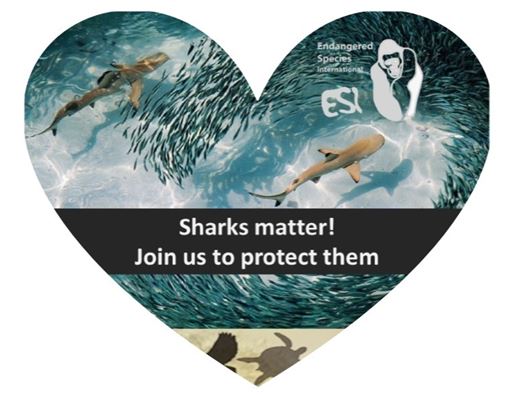|
A recent study found that five key reef shark species (gray, blacktip, whitetip and Caribbean reef sharks, and nurse sharks) declined by 60-73% worldwide. Sharks are very vulnerable to fishing since they do not reproduce very quickly. The good news is that reefs protected or governed with strong fisheries management have healthier shark populations.
In coral reefs, sharks are strongly interacting apex predators and play a key role in maintaining healthy reef ecosystems. The loss of sharks creates cascading effects in the coastal marine ecosystems and beyond. Sharks connect habitats and ecosystems by transferring energy through food webs, shaping marine communities over large spatial scales and affect fundamental aspects of ecosystem function.
Endangered Species International observed that reef sharks are now virtually extinct in 80 percent of the coral reef sites we monitor and restore in the Coral Triangle. In all those sites, sharks used to be commonly present based on historical data and testimonies from fishermen. Another study which surveyed 371 coral reefs in 58 countries, found sharks were virtually absent from 20% of the surveyed reefs, indicating that they were functionally extinct from these ecosystems.
In most cases, the disappearance of sharks is related to nearby human settlements, poor governance, overfishing and the density of the human population. For instance, poorly managed fisheries, especially ones that use longlines and gillnets, could easily wipe out a local shark population.
Sharks are still thriving on reefs in few places around the world, including the Bahamas, continental Australia, the Solomon Islands, the Federated States of Micronesia, and French Polynesia. These successes are the result of full bans on shark fishing, well-managed marine protected areas, low corruption, and science-based fishery management. On the other hand, reef sharks are in a catastrophic state in places where overfishing, poor governance, and corruption is prevalent like in the Philippines and Indonesia.
Migratory species that travel long distances in the ocean, including sharks, turtles and dolphins, face an unprecedented number of threats resulting from human actions. Ongoing declines and lack of recovery of vulnerable and protected shark species are a great cause for concern. That is why Endangered Species International with your generous support creates effective marine protected area and implements actions in the field to save and restore endangered reef shark populations. Join us with your passion and love for saving sharks!

Related Links
|











